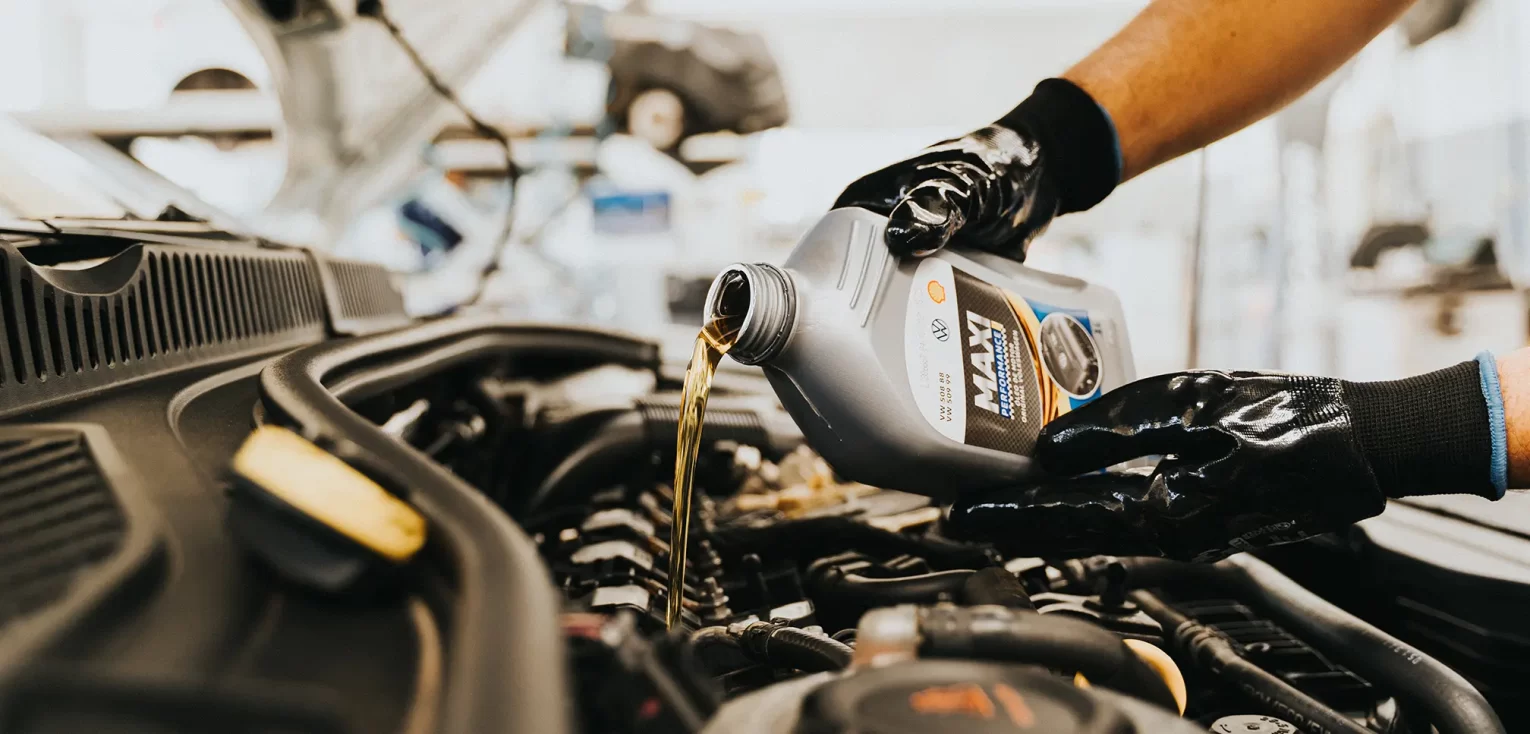Cars need a lot of different fluids to run. Some help to lubricate different areas of your vehicle. Some speed things up or slow things down. And some add important safety measures while you’re driving. Below is a list of 7 fluids in your vehicle, what they do, and when to replace them.
Motor Oil
Motor oil is probably one of the most well-known fluids in a car. Sometimes called engine oil, motor oil acts as a lubricant for engines. Because engines have a lot of metal parts rubbing together, they can create friction and heat up. Motor oil helps to cut down on that friction and keep the engine cool.
Generally speaking, motor oil should be changed every 3 to 6 months or every 3,000 to 5,000 miles. For specifics on your car, check your owner’s manual. It’s also a good idea to check the levels and viscosity on a monthly basis. You can find your oil reservoir under the hood of your car, and you can check it by reading the dipstick. There should be a notch indicating your vehicle’s safe oil level. Anything below the notch will indicate that you either need to top off your oil or have it changed.
Transmission Fluid
Another very important fluid is transmission fluid. It operates similarly to motor oil, only it lubricates the transmission instead of the engine. In manual cars, transmission fluid helps to lubricate the gears and synchros. In automatic cars, it lubricates the gears and clutch pack.
While transmission fluid doesn’t need to be changed as often as motor oil, it is still a good idea to check the levels on a regular basis and to make sure the fluid levels are consistent. Transmission fluid can be checked with a dipstick, just like motor oil. In general, it’s a good idea to have your transmission fluid changed between every 25,000 to 40,000 miles. For specific instructions on your car, check your owner’s manual.
Engine Coolant
Engine coolant, also known as antifreeze or radiator fluid, helps to cool your engine. It draws heat from your car’s engine and sends it through the radiator and out of your car. It’s an important part of your car’s engine system and without it your engine can be at risk of overheating.
Unlike other vehicle fluids, you don’t need to replace your engine coolant too often. It’s a good idea to check it twice a year, but you should only need to change it every 2 to 3 years. Your owner’s manual can tell you exactly how often your vehicle’s engine coolant should be changed.
Brake Fluid
Another important fluid that can be found in your car is brake fluid. Brake fluid moves through the master cylinder and compresses your brake’s calipers. The calipers squeeze your car’s brake pads against the rotors and slow or stop your car. If you notice your brake pedal feeling soft or sinking to the floor, it may be an indicator that you need more brake fluid.
Brake fluid can leak out over time. It’s also hygroscopic, meaning it can attract moisture. Because of this, it can become contaminated by water or rust. You can tell if it’s leaking by checking the levels. If it’s become contaminated, it will look cloudy and dark. It’s a good idea to have your brake fluid checked whenever you get an oil change. You should generally have it replaced every 25,000 miles or whenever you have your brake pads or rotors replaced.
Power Steering Fluid
Your brakes can be powered hydraulically and so can your power steering. Power steering fluid helps to create a link between your vehicle’s steering wheel and the front tires. Like all of the other fluids we’ve been talking about, power steering fluid can break down overtime, get contaminated, or run low.
Of all the fluids, power steering fluid is probably the one that people forget about the most. It can, however, also last for a long time. Most power steering fluid needs to be replaced every 60,000 to 80,000 miles. If you’re not sure exactly when to change your car’s power steering fluid, consult your owner’s manual.
Differential Fluid
Differential fluid, or gear oil as it’s sometimes called, helps your car’s differential move the torque from the engine to the wheels. The differential plays an important role in helping your car navigate turns. It allows the inner and outer wheels to move at different speeds to safely complete the turn.
Like all of the other fluids, differential fluid can wear out over time or pick up debris. In most vehicles, it will need to be changed every 80,000 to 120,000 miles. For specifics on your car’s differential, check the owner’s manual.
Windshield Washer Fluid
Of all the fluids on this list, windshield washer fluid is the least critical fluid for your vehicle’s maintenance. It can, however, play an important role in safely driving your car. Windshield washer fluid helps to clear your windshield of dirt, dust, bugs, road salt, and other debris while you’re driving so you can see the road ahead.
There are no specific intervals you have to follow to keep your windshield washer fluid full. You’ll likely use different amounts at different times. Most cars have a dashboard light that will turn on when the well is getting empty. You can also check under the hood if you think you might need to fill up.
There are special formulas for windshield washer fluid that can help remove bugs or ice, and there are general purpose formulas. If you are using a bug-removing formula, be sure to check if it has a freezing temperature. Most bug washes are meant for summer use, and they may freeze in colder months. You don’t want to get caught with a dirty window and frozen washer fluid.
Call Restored Auto, LLC for help!
If your car needs a fluid changed, a leak fixed, or a repair made, call Restored Auto, LLC for help. We’ll take a look at your vehicle’s reservoirs, top off any low fluids, or make any repairs needed to keep your car lubricated and running smoothly. Call us today to schedule an appointment.

